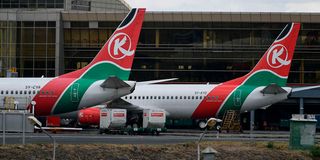If KQ can’t fly, let it swim or sink

A photo taken on November 5, 2022 shows Kenya Airways planes at the parking bay, amid a strike by pilots organised by Kenya Airline Pilots Association (Kalpa), at the Jomo Kenyatta International airport in Nairobi.
How President William Ruto’s administration handles the strike by Kenya Airways pilots will be a litmus test not just of the crisis management skills but also the philosophical and ideological platforms around the role of government.
What we know so far about the ‘Hustler Movement’ and ‘bottom-up’ economics is just empty slogans built on the politics of resentment and class divides.
The first 50 or so days of the new regime have exposed the soft underbelly of a Kenya Kwanza government long on promises and rhetoric but woefully short on concrete proposals towards meeting the expectations of the teeming masses expecting manna from heaven.
One key policy issue the Ruto manifesto barely touched is on the role and reach of government in the overall economic and social sphere.
In Kenya, one would want to also look at the size of government and, in particular, the existence of hundreds of commercial entities that have long outlived their usefulness and now exist only to gobble up public funds.
The Daniel arap Moi, Mwai Kibaki and Uhuru Kenyatta governments all made promises to shut down or divest from parastatal (or is it parasitic?) corporations that have become major drains on the Exchequer. Ultimately, none of them could make the hard political decisions around sanctioning job losses for thousands eating our heard-earned taxes for nothing in return.
The current crisis will show whether President Ruto and his Transport Cabinet secretary, Kipchumba Murkomen, have the gonads to not only stare down the striking pilots but also deliver the message that life can go on without them—and without Kenya Airways.
Yes, it is no longer about being perpetually held hostage by arrogant pampered flight crews but about whether we must continue to throw good money after bad.
The pilots are being extremely irresponsible in, for the umpteenth time, grounding an airline that is already haemorrhaging so much so that it only takes to the air because you and I and everybody else in Kenya must bail it out.
Let’s be clear on one thing first. The social democrat in me is an ardent supporter of worker rights, fair pay and working conditions, the role of trade unions and the right to withhold labour.
Sabotage of ailing employer
The Kenya Airways pilots, however, are not striking just on matters of their pay and working conditions. Theirs is sabotage of an already ailing employer.
As if their inflated salaries—which are a key factor behind KQ’s cash woes—are not enough, they are also presuming the right to practically take over the national carrier.
They are demanding the ejection of the board members and management staff that they do not like. They are also insisting on the adoption and implementation—without question—of their own proposals on how the airline should be run.
That is far beyond any known employee participation manual. They may well have some good ideas on how KQ can improve its services, regain its lustre as the Pride of Africa and go back to profitability but, surely, their ideas cannot be imposed by force. We have many countries around the world that don’t have a national carrier.
The first thing the pilots must be told is that they can continue striking into perpetuity. The next message must be that, if they want to return to work, they must accept pay cuts that put them within realistic bands around the size and revenues of Kenya Airways.
The resultant pay cuts would, of course, not be limited to pilots but also the fellows in the executive suite, who, similarly, have awarded themselves Qatar, Emirates or Lufthansa pay scales yet run an operation a minuscule fraction of the global air giants and are adept only at losing rather than making money.
Next, the government, as a shareholder, must demand that the KQ board and management come clean on the contentious supply contracts and aircraft leasing deals that are believed to be the biggest factor behind the serial losses.
If it is found that KQ has been losing big on lopsided contracts, and that past and present managers and board members, and their political patrons, are the beneficial owners of the shadowy companies hidden in tax shelters, they must be held accountable.
The book must be thrown at them for stealing by servants, conflict of interest, economic crimes and every other offence provided for in law.
Note that this is not about rescuing KQ but allowing it to sink or swim. Either it justifies its existence in returns to shareholders or it is allowed to go belly-up.
Same with every other corporation that is being sustained by the taxpayer.
[email protected]. @MachariaGaitho





